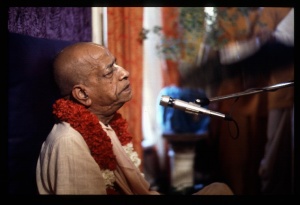CC Madhya 24.272: Difference between revisions
No edit summary |
(Vanibot #0054 edit - transform synonyms into clickable links, which search similar occurrences) |
||
| Line 17: | Line 17: | ||
<div class="synonyms"> | <div class="synonyms"> | ||
''nārada kahe'' | ''[//vanipedia.org/wiki/Special:VaniSearch?s=nārada&tab=syno_o&ds=1 nārada] [//vanipedia.org/wiki/Special:VaniSearch?s=kahe&tab=syno_o&ds=1 kahe]'' — Nārada Muni said; ''[//vanipedia.org/wiki/Special:VaniSearch?s=vyādha&tab=syno_o&ds=1 vyādha]'' — my dear hunter; ''[//vanipedia.org/wiki/Special:VaniSearch?s=ei&tab=syno_o&ds=1 ei] [//vanipedia.org/wiki/Special:VaniSearch?s=nā&tab=syno_o&ds=1 nā] [//vanipedia.org/wiki/Special:VaniSearch?s=haya&tab=syno_o&ds=1 haya] [//vanipedia.org/wiki/Special:VaniSearch?s=āścarya&tab=syno_o&ds=1 āścarya]'' — this is not wonderful for you; ''[//vanipedia.org/wiki/Special:VaniSearch?s=hari&tab=syno_o&ds=1 hari]-[//vanipedia.org/wiki/Special:VaniSearch?s=bhaktye&tab=syno_o&ds=1 bhaktye]'' — by advancement in devotional service; ''[//vanipedia.org/wiki/Special:VaniSearch?s=hiṁsā&tab=syno_o&ds=1 hiṁsā]-[//vanipedia.org/wiki/Special:VaniSearch?s=śūnya&tab=syno_o&ds=1 śūnya] [//vanipedia.org/wiki/Special:VaniSearch?s=haya&tab=syno_o&ds=1 haya]'' — one becomes nonviolent and nonenvious; ''[//vanipedia.org/wiki/Special:VaniSearch?s=sādhu&tab=syno_o&ds=1 sādhu]-[//vanipedia.org/wiki/Special:VaniSearch?s=varya&tab=syno_o&ds=1 varya]'' — thus one becomes the best of honest gentlemen. | ||
</div> | </div> | ||
Latest revision as of 23:06, 19 February 2024

A.C. Bhaktivedanta Swami Prabhupada
TEXT 272
- nārada kahe,—"vyādha, ei nā haya āścarya
- hari-bhaktye hiṁsā-śūnya haya sādhu-varya
SYNONYMS
nārada kahe — Nārada Muni said; vyādha — my dear hunter; ei nā haya āścarya — this is not wonderful for you; hari-bhaktye — by advancement in devotional service; hiṁsā-śūnya haya — one becomes nonviolent and nonenvious; sādhu-varya — thus one becomes the best of honest gentlemen.
TRANSLATION
"Nārada Muni said, 'My dear hunter, such behavior is not at all astonishing. A man in devotional service is automatically nonviolent. He is the best of gentlemen.
PURPORT
In this verse the word sādhu-varya means "the best of gentlemen." At the present moment there are many so-called gentlemen who are expert in killing animals and birds. Nonetheless, these so-called gentlemen profess a type of religion that strictly prohibits killing. According to Nārada Muni and Vedic culture, animal-killers are not even gentlemen, to say nothing of being religious men. A religious person, a devotee of the Lord, must be nonviolent. Such is the nature of a religious person. It is contradictory to be violent and at the same time call oneself a religious person. Such hypocrisy is not approved by Nārada Muni and the disciplic succession.